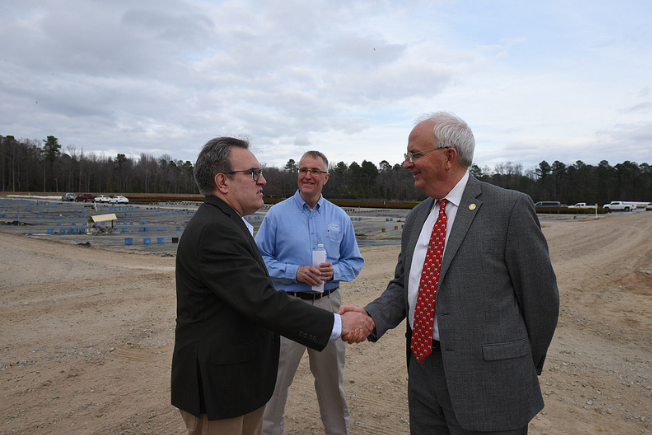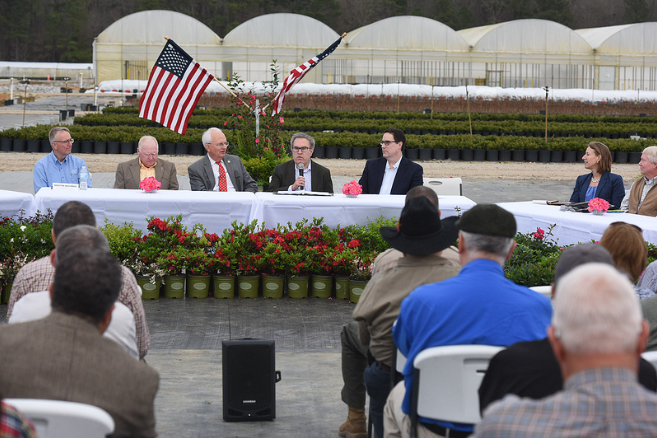
EPA Acting Administrator Wheeler Promotes President Trump's
State of the Union Address In Georgia
Administrator Wheeler met with members of Ga. and S.C. Farm Bureaus, as well as local and
state officials to discuss WOTUS and our new nutrient reduction policy
AUGUSTA — U.S. Environmental Protection Agency (EPA) Acting Administrator Andrew Wheeler visited Georgia today to promote President Trump's successful State of the Union address. While meeting with local and state officials at McCorkle Nursery in Dearing, Georgia, Acting Administrator Wheeler discussed EPA's ongoing efforts to redefine the "Waters of the United States" rule as well as EPA's efforts to improve America's infrastructure through reforms in the Agency and direct funding through EPA's Water Infrastructure Financing and Innovation Act (WIFIA) program. Finally he unveiled EPA's new nutrient reduction policy.
"From proposing our new waters of the U.S. definition to accelerating permits to financing new water infrastructure, the people of Georgia are excited about the ways EPA is delivering on the bold agenda that President Trump presented in his State of the Union address," said EPA Acting Administrator Andrew Wheeler. "We also announced an important new strategy to promote market-based mechanisms to address excess nutrients in surface waters and improve our nation's water quality."
"With WOTUS and so many other reform initiatives, the Trump Administration approach to regulation is refreshing." said Georgia Agriculture Commissioner Gary W. Black. "Let's help people start a business. Let's help people stay in business. Let's help people stay in business with clear rules. Let's stop putting people out of business with dumb rules. This message resonates with the American people."
"An important part of improving our nation's water quality is leveraging the collective resources of the federal family and improving relationships with our partners on the ground," said EPA Assistant Administrator for Water David Ross. "Building on efforts already underway at the state, local and tribal level, EPA is taking a number of steps to help facilitate the use of a broad range of tools and technologies that will deliver critical water quality improvements at a lower cost."
"Our farmers work hard to protect the environment because their livelihood depends on it, and we greatly appreciate the chance to share that message with administrator Wheeler in person," said George Farm Bureau President Gerald Long. "We greatly appreciate the work EPA has done to scale back regulations, like the Waters of the United States rule, that cause undue burdens on our farmers. We look forward to working with the EPA to protect the environment while ensuring we can continue to work to feed the world."
Nutrient Policy
Earlier today, EPA announced a new water quality trading policy memorandum that will help states, tribes, and stakeholders use market-, incentive-, and community-based programs to reduce excess nutrients and improve water quality in their communities.
EPA has supported the use of water quality trading, offsets and similar programs for achieving compliance with regulatory requirements of the Clean Water Act for many years. Today's memo reiterates the agency's support for water quality trading and other market-based programs to maximize pollutant reduction efforts and improve water quality and builds on the Trump Administration's efforts to demonstrate that support.
EPA's new trading memo identifies the following six Market Based Principles designed to encourage creativity and innovation in the development and implementation of programs that reduce pollutants in our Nation's waters:
- States, tribes and stakeholders should consider implementing water quality trading and other market-based programs on a watershed scale.
- EPA encourages the use of adaptive strategies for implementing market-based programs.
- Water quality credits and offsets may be banked for future use.
- EPA encourages simplicity and flexibility in implementing baseline concepts.
- A single project may generate credits for multiple markets.
- Financing opportunities exist to assist with deployment of nonpoint land use practices.
EPA's actions are part of a larger collaboration with stakeholders across the country to better coordinate and focus federal resources on some of the nation's most challenging water resource concerns, including addressing excess nutrients in waterways.
Infrastructure
As highlighted in President Trump's State of the Union address and in support of the President's Infrastructure Initiative, EPA has accelerated investment in the nation's aging water infrastructure. Over the past year, EPA has moved President Trump's infrastructure agenda forward by working to get the financing, tools, and resources EPA's state, local, tribal, and other partners need to modernize outdated water infrastructure, while improving local water quality, creating jobs, and better protecting public health.
EPA has also taken a leading role in the Administration's initiative to promote greater efficiencies in the infrastructure permitting process. These actions include working to provide a clear and predictable approach to identifying waters that are subject to federal authority through the Department of the Army's and EPA's proposed "Waters of the United States" (WOTUS) rulemaking. By clearly defining where federal jurisdiction begins and ends, the new proposed WOTUS definition will provide states and the private sector the regulatory certainty they need to develop and streamline projects that will modernize our nation's aging infrastructure.
EPA's Water Infrastructure Finance and Innovation Act (WIFIA) program is EPA's newest water financing program which provides long-term, low-cost supplemental loans for regionally and nationally significant projects. In 2018, EPA issued seven WIFIA loans totaling nearly $2 billion to help finance over $4 billion for water infrastructure projects and create up to 6,000 jobs. In November 2018, EPA invited 39 additional projects in 16 states and Washington, D.C. to apply for a WIFIA loan.
Together, these selected borrowers will receive WIFIA loans totaling approximately $5 billion to help finance over $10 billion in water infrastructure investments and create up to 155,000 jobs.
For more information about EPA's WIFIA program, visit: https://www.epa.gov/wifia

EPA Acting Administrator Wheeler greets the host Skeeter McCorkle and Georgia Agriculture Commissioner Gary Black in Augusta.

Acting EPA Administrator Wheeler addresses Georgia and South Carolina farmers and foresters in Augusta.

EPA Acting Administrator Wheeler meets with team members of McCorkle Nursery.
US EPA, Office of Public Engagement, 1200 Pennsylvania Avenue NW, Washington, DC 20460 United States






0 comments:
Post a Comment